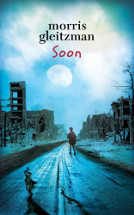Soon by Morris Gletizman

Viking, 2015. ISBN 9780670078875
(Age: 14+) Part of the sequence which began with Once, in
this story our familiar young Jewish boy Felix is still trying to
survive in Poland at the end of the Second World War after the
Soviets have driven out the German army. Having avoided death at the
hands of Nazis on numerous occasions and somehow managing to
continue to keep starvation at bay, he and his older friend Gabriek
are now threatened by roaming gangs of Nationalist thugs.
Sadly familiar with atrocities, violence and cruelty perpetrated by
German invaders, Felix is still naively hopeful and continues to be
shocked and distressed by inhumanity. He is dismayed by the attitude
of Poles who, having endured everything that has gone before, now
harbour hatred for Jews and Slavic people, hunting them mercilessly
through ruined cities and murdering without thought. As he does in
the other novels, Gleitzman constantly emphasises that amongst the
brutality and barbarity, individuals showed compassion, sometimes
exposing themselves to great risk to assist others. Felix has a
strong moral compass and his constant desire to do what is right,
being honest and loyal, causes him emotional turmoil which places
him in grave danger when he could otherwise turn his head and walk
away.
Readers of the earlier novels will recall how a gentle humour
persists in a narrative which is still completely respectful in
dealing with the unspeakable events of the Holocaust. In this novel,
Felix's continuing desire to practice medicine lands him in a range
of situations which snowball disastrously to place him, Gabriek, a
baby and a new friend in grave danger. Felix's unyielding desire to
do what is morally correct makes resolving the conundrum incredibly
complicated and the brave little hero who is incapable of harming
others shows great courage in overcoming his own terrors to try to
protect the vulnerable.
Without spoiling the story it is necessary to state that whilst hope
and human kindness are powerful themes in this tale, death,
violence, suffering and racial hatred are present. These elements,
together with reference to abhorrent medical experimentation on
captives by Nazi doctors makes this novel unsuitable for readers
under 14 in my opinion. This moving tale is the product of detailed
research and will serve to educate about the horrors of war and the
excesses of maniacal regimes.
The author emphasises that it is not necessary to read the preceding
works as a series as they effectively stand alone.
Rob Welsh